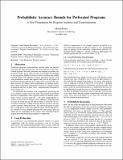Probabilistic Accuracy Bounds for Perforated Programs: A New Foundation for Program Analysis and Transformation
Author(s)
Rinard, Martin C.
DownloadRinard_Probabilistic accuracy.pdf (129.7Kb)
OPEN_ACCESS_POLICY
Open Access Policy
Creative Commons Attribution-Noncommercial-Share Alike
Terms of use
Metadata
Show full item recordAbstract
Traditional program transformations operate under the onerous constraint that they must preserve the exact behavior of the transformed program. But many programs are designed to produce approximate results. Lossy video encoders, for example, are designed to give up perfect fidelity in return for faster encoding and smaller encoded videos [10]. Machine learning algorithms usually work with probabilistic models that capture some, but not all, aspects of phenomena that are difficult (if not impossible) to model with complete accuracy [2]. Monte-Carlo computations use random simulation to deliver inherently approximate solutions to complex systems of equations that are, in many cases, computationally infeasible to solve exactly [5].
Date issued
2011-01Department
Massachusetts Institute of Technology. Computer Science and Artificial Intelligence Laboratory; Massachusetts Institute of Technology. Department of Electrical Engineering and Computer ScienceJournal
Proceedings of the 20th ACM SIGPLAN Workshop on Partial Evaluation and Program Manipulation (PEPM '11)
Publisher
Association for Computing Machinery (ACM)
Citation
Martin Rinard. 2011. Probabilistic accuracy bounds for perforated programs: a new foundation for program analysis and transformation. In Proceedings of the 20th ACM SIGPLAN workshop on Partial evaluation and program manipulation (PEPM '11). ACM, New York, NY, USA, 79-80.
Version: Author's final manuscript
ISBN
978-1-4503-0485-6